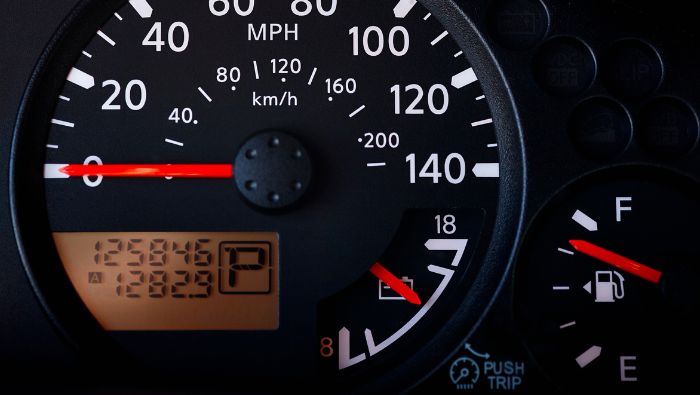Why and How To Track Gas Mileage + Tips for Improving It
by Rose Scott

Do you know how far your car can go on a gallon of gas? Or how far it should be able to go?
Perhaps one of the reasons you chose your car is because it gets good gas mileage. But if you don’t track your car’s fuel economy, you might not easily notice if it has decreased.
Gas mileage, also known as fuel economy, is simply a measure of how far a vehicle can travel on a given amount of fuel, and it isn’t too tough to figure out. Read on to discover the benefits of tracking your car’s gas mileage, how to track it and some tips for improving it.
Why You Should Track Gas Mileage
Here are several benefits of tracking your car’s gas mileage:
Financial Savings
By monitoring your gas mileage, you can identify patterns and adjust your driving habits, vehicle maintenance or route planning to improve fuel efficiency. This can save you money on fuel costs over time.
Vehicle Maintenance
Regularly monitoring gas mileage can alert you to potential maintenance issues, such as dirty air filters, underinflated tires or malfunctioning oxygen sensors, which can impact fuel efficiency. Addressing these issues as you discover them can help you avoid costly repairs and extend the life of your vehicle.
Sign Up for Savings
Subscribe to get money-saving content by email that can help you stretch your dollars further.
Twice each week, you'll receive articles and tips that can help you free up and keep more of your hard-earned money, even on the tightest of budgets.
We respect your privacy. Unsubscribe at any time.
Budgeting
Keeping track of your gas mileage can help you plan and manage your transportation expenses more effectively, especially if you drive a significant amount for work or travel.
Comparison Shopping for a New Vehicle
If you’re in the market for a new vehicle, knowing the gas mileage on your current car may help you compare different makes and models based on their fuel efficiency.
Related: How To Beat the Car Dealer
Tax Purposes
If you use your vehicle for business purposes, tracking gas mileage can help you accurately calculate and claim tax deductions for work-related travel expenses.
Environmental Impact
If you’re trying to reduce your environmental impact but can’t afford a more fuel-efficient vehicle, tracking gas mileage can help you make eco-friendly choices and reduce emissions.
How To Track Your Car’s Gas Mileage
You can track your car’s gas mileage using the following simple steps.
- Fill up your gas tank completely.
- Reset your vehicle’s trip odometer to zero.
- Drive your vehicle as you normally would for a certain distance, such as 100 miles.
- Refill your gas tank to the same level as before.
- Note the number of gallons it took to refill the tank.
- Divide the number of miles you traveled by the number of gallons it took to refill the tank. This will give you your vehicle’s gas mileage for that particular trip.
For example, if you drove 100 miles and it took 4 gallons of gas to refill your tank, your gas mileage would be 25 miles per gallon (100 miles / 4 gallons = 25 miles per gallon).
You can also keep track of your gas mileage over time by recording the number of miles you drive and the amount of gas you use for each fill-up.
Tips for Improving Gas Mileage
Here are some simple things you can do that may help you get more miles out of each gallon of gas.
- Drive smoothly: Avoid aggressive driving, such as rapid acceleration and hard braking, as these actions consume more fuel.
- Maintain a steady speed: Keep a constant speed while driving, especially on highways, as fluctuating speeds consume more fuel.
- Keep your tires inflated: Low tire pressure can reduce fuel efficiency, so make sure your tires are inflated to the pressure indicated in your car’s user manual.
- Avoid idling: Turn off your engine when you’re not moving for an extended time, such as when waiting for someone or stuck in stand-still traffic.
- Use air conditioning sparingly: Air conditioning can consume a lot of fuel, so use it only when necessary, and try to park in the shade to keep your car cool.
- Avoid carrying unnecessary weight: Extra weight in your car, such as heavy cargo, reduces fuel efficiency.
- Use the recommended octane level: Using a higher octane level than recommended by your car’s manufacturer is unnecessary and can lead to wasting fuel.
- Keep your car well-maintained: Regular maintenance, such as oil changes and air filter replacements, can improve fuel efficiency.
Start Tracking Your Gas Mileage at Your Next Fill Up
As you can see, tracking your gas mileage is easy to do.
Why not make a game of it to see how much you can improve your gas mileage and how much less you can spend at the pump?
Reviewed December 2023
Popular Articles
- 7 Habits of Highly Frugal People
- 5 Simple Budget Cuts That Can Save $200 a Month
- How to Track Down Unclaimed Funds Owed You
- 32 Ways to Save Money on Your Utility Bills
- Do You Need Credit Life Insurance When Buying a New Car?
- How to Maximize Profits When Selling Online
- Staying Motivated to Continue Digging Yourself Out of Debt
On After50Finances.com
- 9 Things You Need to Do Before You Retire
- You Didn’t Save Enough for Retirement and You’re 55+
- When Empty Nesters Reorganize and Declutter Their Home
- Reinventing Your Career in Your 50s or 60s
- What Mature Homeowners Should Know about Reverse Mortgages
- 2 Reasons to Collect Social Security Benefits As Soon As Possible

